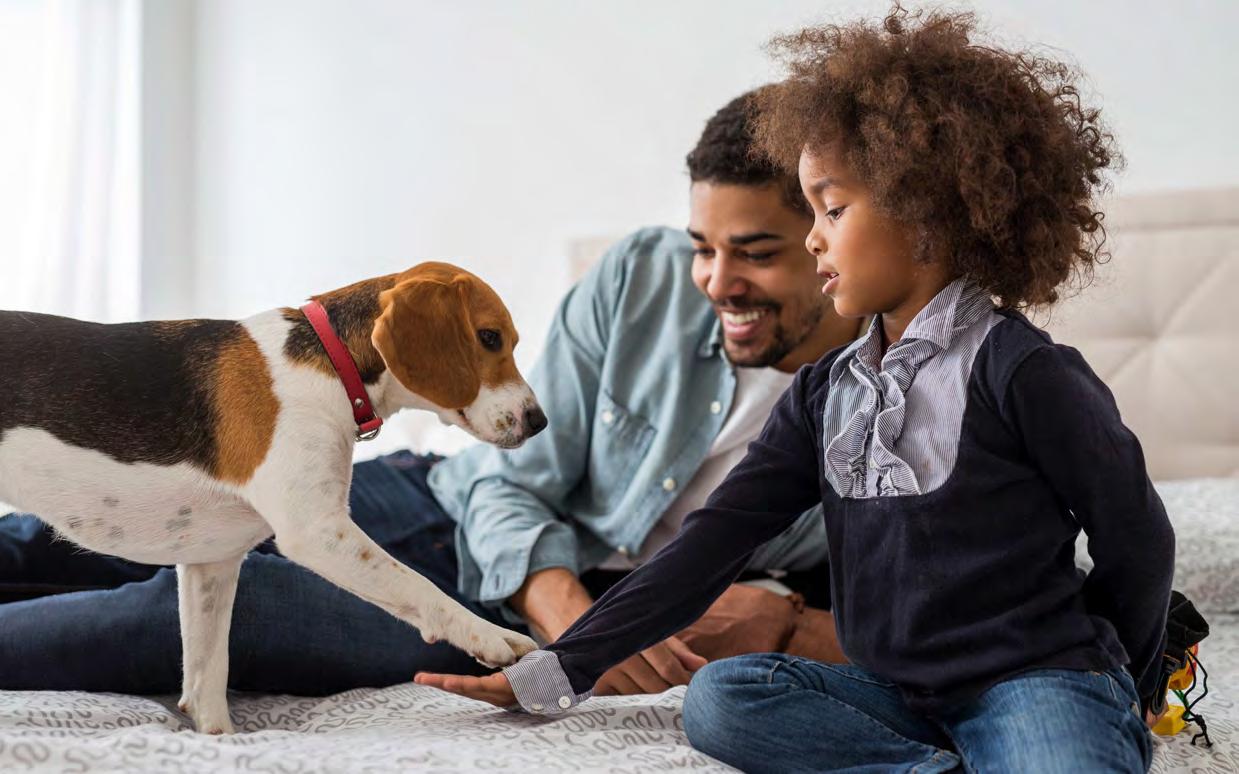
5 minute read
Economics of Pet-Inclusive Housing
Pet-friendly vacancies are good for the bottom line
Owner/operators who are considering adding a pet-inclusive policy or evaluating their current one should know how their policy positively impacts their bottom line. Ultimately, owner/operators can come out ahead financially by enacting pet-inclusive policies.
Residents pay pet deposits and fees that are in excess of pet damages.
Average security deposit: $625 Average pet deposit:
$232 (in addition to security deposit) Average one-time pet fee: $244 Average monthly pet rent: $49 Average pet damages: $210 (9% of pets)
According to the data, the average pet deposit is more than the average damage amounts caused by pets. Only 9% of pets are reported to cause any damage whatsoever, and the average damages are only $210. Furthermore, only 2% of pets caused damage requiring a security deposit deduction, with the majority of pet owners paying out of pocket to fix any damages.
The research showed that pet-owning residents are paying an average of $857 in combined security and pet deposits, an average of $244 onetime pet fees, and an average of $600 annually in monthly pet fees.
Pet-friendly units are faster and easier to fill. 83% of owner/operators say pet-friendly vacancies are filled faster. 79% say that they are easier to fill. Both of these contribute to the owner/ operator’s bottom line.
83%
79%
11%
of all renters have a pet even though their building doesn’t allow them.
2.5 million
rental properties house unapproved pets. At an average annual pet rent of $600, that adds up to an additional
1.5 billion
in pet fees and deposits that owner/operators could be collecting.
Residents with pets stay longer. Our survey found that residents in pet-friendly housing stayed 21% longer than their non-pet-friendly housing counterparts. This translates to residents staying about 10 additional months..
People will move for their pets. 35% of residents said their pet was a reason for previously having to move. 41% of Gen Z and Millennials have moved because of a pet.
UNAPPROVED PETS TRANSLATE TO LOST REVENUE
Owner/operators are missing out on the financial benefit of pet- inclusive policies. 11% of renters say they have an unapproved pet, avoiding pet deposits and fees in the process. When owner/operators embrace pet-inclusive policies, residents are more likely to pay pet deposits and fees.
By offering a pet-inclusive environment and setting reasonable, welcoming standards, owner/operators protect their property, discourage people from circumventing pet regulations, and have the potential to generate significantly more revenue. If 2.5 million renters with unapproved pets paid the average annual pet rent of $600, owner/operators would collect an additional $1.5 billion in revenue.

FUTURE RESIDENTS ARE LOOKING FOR PET-INCLUSIVE HOUSING
Rental housing needs to evolve to meet the needs of Millennials and Gen Z. The No. 1 step owner/operators can take to attract Millennial and Gen Z residents is to adopt a pet-inclusive policy. Millennials and Gen Z are more likely to continue renting instead of buying a home, unlike their predecessors. They also are more likely to own or want to have pets. Millennials now comprise the majority of residents in the housing market.
With older members of Gen Z now entering the rental market, smart owner/operators will be reevaluating their property’s policies given the evolving priorities and needs of younger generations.
Younger generations are more likely to have or want pets. 42% of pet owners were from Gen Z and Millennial generations, followed by Gen X, representing 37%.
While those figures may not seem far apart, younger generations are more likely to adopt animals in the near future. 48% of Gen Z and Millennials said they were likely to adopt a pet in the next year. This is in comparison to 26% of Gen X and less than 20% of Boomers.
Gen Z and Millennials are willing to do the hard work for their pets. Younger residents want to keep their pets and are willing to take extra steps to show that their pet is well-behaved and a good fit for the property. They are ready to provide owner/operators additional materials more frequently than previous generations.

80%
of pet-owning residents are Gen Z or Millennials, and
48%
PET OWNERS BY GENERATION
15.8%
Younger Boomers
4.6%
Older Boomers
36.9%
Gen X
42.6%
Gen Z/Millennials Gen Z and Millennials are most willing to provide additional materials about their pet to be a more appealing applicant.
Gen Z/ Millennials 41% Gen X 27% Younger Boomers 17% Older Boomers 23%

DATA SHOWS THAT PET-INCLUSIVE HOUSING MAKES FINANCIAL SENSE
1
COST-EFFECTIVE
Owner/operators create opportunities to collect additional revenue in pet fees, which more than cover potential damages
2
3
MEETS MARKET NEEDS
ADDRESSES CHANGING DEMOGRAPHICS
Owner/operators receive 10 more months of rent from each unit and fill pet housing units easier and quicker than non-pet units, decreasing turnover and vacancy rates Owner/operators who embrace pet-inclusive housing address market shortages and command a growing share of the housing market
By embracing pet-inclusive policies, owner/
operators can respond to changing resident demographics by better attracting younger residents who are more committed to their pets
EASING RESTRICTIONS CAN SAVE MILLIONS OF PET LIVES
Easing restrictions will close the market gap and create opportunities for owner/operators and residents to prevent pet relinquishments and create new, loving homes for millions of pets.
Restrictions on pet-friendly housing suppress the market for future pet ownership. Approximately one third of residents who are currently hindered by restrictions would get a pet (or another pet) if they were lifted. Up to 8.2 million animals could find new homes if restrictions were lifted over time.
Not all residents are able to move in order to keep their pets; residents’ fear of eviction has resulted in as many as 700,000 pets being surrendered, more than have been surrendered as a result of specific housing restrictions or budget limitations.
Policy changes that minimize the number of pets that must be surrendered as well as make pet ownership more attainable through more pet-inclusive rental housing have the potential to save up to 10.5 million pets nationwide.

33%
Would get another pet if restrictions were lifted
Pet owners with housing restrictions
35%
Would get a pet if restrictions were lifted
Non-pet owners with housing restrictions
14%
Surrendered their pet as a result of their housing situation
24%
Definitely/ probably would get a pet if restrictions were lifted
Note: This accounts for all people who surrendered their pet or would be likely to get a pet if restrictions were lifted (some residents qualify under both). Based on a survey of 1,049 residents nationwide.




